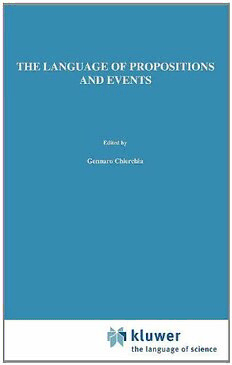Download The language of propositions and events: issues in the syntax and the semantics of nominalization PDF Free - Full Version
Download The language of propositions and events: issues in the syntax and the semantics of nominalization by Alessandro Zucchi in PDF format completely FREE. No registration required, no payment needed. Get instant access to this valuable resource on PDFdrive.to!
About The language of propositions and events: issues in the syntax and the semantics of nominalization
The Language of Propositions and Events offers a comprehensive theory of the relation between noun meaning and verb meaning. Two main theses are defended in this book. The first thesis is that an adequate account of the interpretation and distribution of nominals calls for a distinction between three types of entities in the domain of discourse: events, propositions, and states of affairs. It is argued that different types of nominals differ in their ability to denote entities of these types and that predicates differ in their ability to select for them. The second main thesis is that an adequate characterization of the relation between noun meaning and verb meaning can be given by taking account of the fact that situations may stand in the part of relation. Kratzer's semantics of situations is the basis for this analysis of nominalization. Moreover, the book addresses the issue of the argument structure of nominals and offers an analysis of the puzzling distribution of infinito sostantivato in Italian. For graduate students in semantics and syntax, theoretical linguists, philosophers of language, students of Romance linguistics.
Detailed Information
| Author: | Alessandro Zucchi |
|---|---|
| Publication Year: | 1993 |
| ISBN: | 9780792324379 |
| Pages: | 150 |
| Language: | English |
| File Size: | 6.527 |
| Format: | |
| Price: | FREE |
Safe & Secure Download - No registration required
Why Choose PDFdrive for Your Free The language of propositions and events: issues in the syntax and the semantics of nominalization Download?
- 100% Free: No hidden fees or subscriptions required for one book every day.
- No Registration: Immediate access is available without creating accounts for one book every day.
- Safe and Secure: Clean downloads without malware or viruses
- Multiple Formats: PDF, MOBI, Mpub,... optimized for all devices
- Educational Resource: Supporting knowledge sharing and learning
Frequently Asked Questions
Is it really free to download The language of propositions and events: issues in the syntax and the semantics of nominalization PDF?
Yes, on https://PDFdrive.to you can download The language of propositions and events: issues in the syntax and the semantics of nominalization by Alessandro Zucchi completely free. We don't require any payment, subscription, or registration to access this PDF file. For 3 books every day.
How can I read The language of propositions and events: issues in the syntax and the semantics of nominalization on my mobile device?
After downloading The language of propositions and events: issues in the syntax and the semantics of nominalization PDF, you can open it with any PDF reader app on your phone or tablet. We recommend using Adobe Acrobat Reader, Apple Books, or Google Play Books for the best reading experience.
Is this the full version of The language of propositions and events: issues in the syntax and the semantics of nominalization?
Yes, this is the complete PDF version of The language of propositions and events: issues in the syntax and the semantics of nominalization by Alessandro Zucchi. You will be able to read the entire content as in the printed version without missing any pages.
Is it legal to download The language of propositions and events: issues in the syntax and the semantics of nominalization PDF for free?
https://PDFdrive.to provides links to free educational resources available online. We do not store any files on our servers. Please be aware of copyright laws in your country before downloading.
The materials shared are intended for research, educational, and personal use in accordance with fair use principles.

